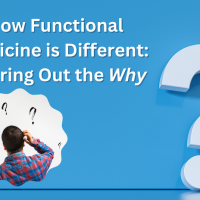Functional Medicine vs Conventional Medicine

How Functional Medicine
Gives You a Better Approach to Health
Have you ever been told, “Your test results are normal” when you know something still isn’t right? Or maybe you’ve been given a prescription that helps for a while, but the problem keeps coming back?
That’s because traditional healthcare focuses on managing symptoms, not finding and fixing the root cause of the issue.
Functional medicine takes a different approach. Instead of just looking at individual symptoms, I take the time to understand how everything in your body is connected. My goal is to help you get to the bottom of what’s causing your health challenges so you can feel better—for good.
How is Functional Medicine
Different from Conventional Medicine?
Most conventional healthcare works like this:
🔹 Short appointments where doctors focus only on symptoms
🔹 Medications to manage issues instead of finding the root cause
🔹 A “one-size-fits-all” approach based on standard treatment guidelines
But your body is unique, and what works for someone else may not work for you. That’s why functional medicine coaching focuses on personalized care and looking at the whole picture—your diet, stress, lifestyle, and environment—to figure out what’s actually causing your symptoms.
Here’s a side-by-side look at how functional medicine coaching compares to conventional medicine:
1. Time & Attention to Your Health
Conventional Medicine: Appointments are often 7-15 minutes long, with a focus on identifying a diagnosis and prescribing medication.
Functional Medicine Coaching: My sessions are much longer, giving me time to ask the right questions and truly understand your health concerns. I take a deep dive into your lifestyle, nutrition, stress, and medical history to get a full picture of your health.
2. Finding the Root Cause vs. Treating Symptoms
Conventional Medicine: The focus is on managing symptoms with medications or procedures. For example, if you have heartburn, you might be given an antacid—but what’s causing the heartburn in the first place?
Functional Medicine Coaching: I look at why you have symptoms in the first place. Instead of just masking the issue, I help you figure out if your symptoms come from gut health imbalances, food sensitivities, stress, or inflammation—and then we work to fix it.
3. Personalized vs. One-Size-Fits-All Care
Conventional Medicine: Treatment is based on standard protocols for diseases. If two people have the same condition, they’ll likely get the same treatment—even if their root causes are different.
Functional Medicine Coaching: I take an individualized approach. Every person has a unique history, genetics, and lifestyle, so I create a plan that fits you, your body, and your specific needs.
4. Prevention & Long-Term Health vs. Quick Fixes
Conventional Medicine: The focus is on diagnosing diseases once they’ve already developed. Medications help manage the condition, but often don’t stop it from getting worse over time.
Functional Medicine Coaching: I focus on prevention and long-term healing. Many chronic diseases—like diabetes, autoimmune conditions, Mast Cell Activation Syndrome, Long COVID, and digestive issues—start long before they are officially diagnosed. By identifying imbalances early, I can help you make changes that prevent bigger health problems down the road.
5. Working With Your Body vs. Overriding Symptoms
Conventional Medicine: Medications often suppress symptoms instead of working with the body’s natural healing processes.
Functional Medicine Coaching: I believe your body is designed to heal itself when given the right support. Through nutrition, lifestyle changes, stress management, and targeted supplements, I help you create an environment where your body can restore balance.
What About Testing? Do I Need Lab Work?
Functional medicine coaching often includes specialized lab testing to uncover hidden imbalances. These aren’t the same tests you’d typically get at a doctor’s office. Instead, they can provide insights into issues like gut health, inflammation, nutrient deficiencies, and hormone imbalances that may be affecting how you feel.
What Happens When You Work With Me?
If you’re tired of feeling stuck, frustrated, or unheard in your healthcare journey, functional medicine coaching can give you a new path forward.
Here’s what to expect:
✔ A deep dive into your health story—I take time to listen and understand what’s really going on.
✔ A customized plan made just for you—No one-size-fits-all advice. Your plan will fit your body, lifestyle, and goals.
✔ Ongoing support to keep you on track—We meet twice a month so you’re never left figuring things out alone.
Is Functional Medicine Coaching Right for You?
This approach is a great fit if:
✅ You’re tired of quick fixes that don’t work long-term
✅ You feel like your doctor isn’t listening to you
✅ You want to focus on prevention and long-term health
✅ You need guidance and support to make lasting changes
Take Control of Your Health Today
If you’re ready to stop guessing, start healing, and finally feel like yourself again, I’m here to help.
Let’s uncover the root causes of your health issues, create a plan that actually works for you, and give your body the support it needs to heal naturally.
Sign up today and take the first step toward real answers and lasting wellness.

Further Reading: Functional Medicine
- The Process: A Personalized Approach to Functional Medicine
- Your Doctor Doesn’t Have Time For You – How I Can Help
- What is a Functional Medicine Coach, and Why Should You Hire One?
- What Can a Functional Medicine Coach Do?
- Functional Medicine and Finding the Root Cause
- What is a Consultation Like with a Functional Medicine Coach?
- Functional Medicine FAQ’s
- Functional Medicine vs. Conventional Medicine
- The Power of Functional Medicine Coaches



